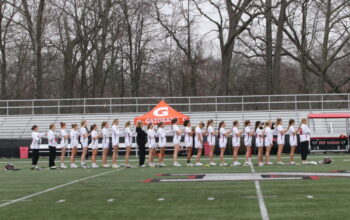Connor Kilbane, senior co-captain of the Basketball team, has wanted to be a captain since his freshman year, reiterating Kevin’s message of effort. “Hard work and hustling is what you have to do to get what you want,” Connor said.
Another common misconception about being a captain is that talent is the most important factor. “Skill is really not as important as a captain,” Kevin said. “Everyone has [athletic skill]in them; its mostly leadership and hard work.”
Molly Robustelli, senior captain of the girls’ ice hockey team, noted past captains as good examples for their leadership skills, not their athletics. “I always looked up to captains like Shelby Barrata, Maggie Burke and Jana Persky,” she said. “They were always supportive, helping to deal with the pressure of playing and dealing with the coaches. They were really good role models, on and off the ice.”
Kevin also gave credit to his previous captains. “They were great examples my sophomore year and did a really good job of inspiring us,” he said. “They reached out to the younger kids and made the team a family.”
In some cases, however, the example of past captains wasn’t ideal. Connor reflects on last year’s difference to this year. “We never watched film, and we didn’t work as hard – we did enough to just get by.”
As this year’s captain, though, Connor learned from these mistakes in the hopes of building a better team. “We have workouts before and after to develop skills, we go over plays during gym time and we work on weekends, too,” he said.
Captains not only have to organize players during practice; there are other, more mental responsibilities involved. “You try to set a good example because you want to get the best out of every player,” Kevin said. “You have to make sure there aren’t any big conflicts going on, as well.”
Molly agreed with Kevin, saying how mediation and keeping a cool head is vital for the team as a whole. “You have to remain positive and supportive,” Molly said. “No one can see you down because it can demoralize others. It’s important to keep the energy flowing.”
Molly also cited her responsibility to the coaches in addition to the team. “Communication between coaches and players is important because you’re making sure everything runs smoothly and you’re making the coaches’ jobs easier,” she said. “Players should worry about the playing aspect and coaches should worry about the coaching aspect, and no one should worry about the in between.”
Connor talked about how a lot of his responsibility is organizing the players on the team. “I make sure everyone does what they’re supposed to do and are in the position they’re supposed to be in,” he said. “I try to make the underclassmen feel welcome by organizing team dinners and uniforms on game day. A lot of it is time management.”
Attitude as both a player and a captain is recognized by all four captains as extremely important to the health of the team. “You try to lead by example, never giving up and working one hundred percent,” Molly said. Molly was able to test out her role as a captain while on the field hockey team this fall. “I started paying attention to how my peers reacted to my attitude and how to gain respect from players,” she said.
Connor also noted how his fellow players respond to his actions. “Basically, the underclassmen are just looking up at the captains, trying to do what they would or better,” he said. “It’s about how much control you can have and if they respect you as a player, even in the off-season.”
It’s clear that a team’s players are reliant on their captains for support, direction, and leadership. It’s these qualities that give an example for younger players to follow, something that projects what the future team will be like, and something Kevin noticed this past season. “A lot of younger kids and kids who weren’t even captains stepped up,” he said. “I don’t think it was me as a captain that did that, though. We’re just lucky to have some really great members on our team.”





One thought on “Teach me how to Captain”
Comments are closed.